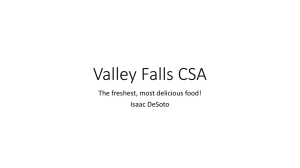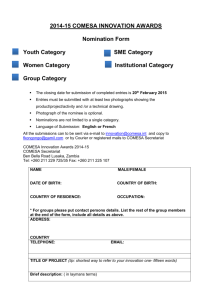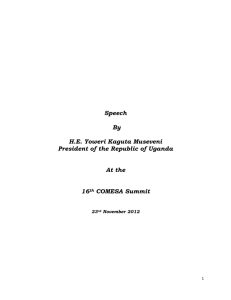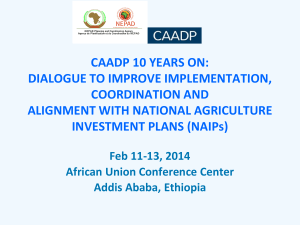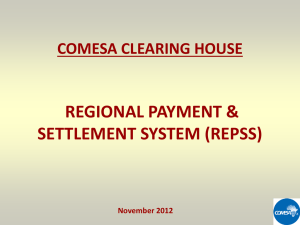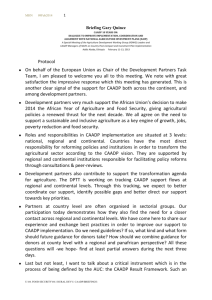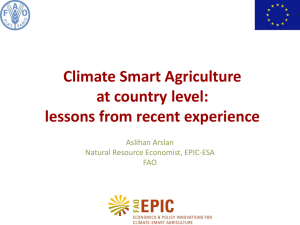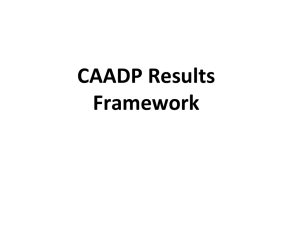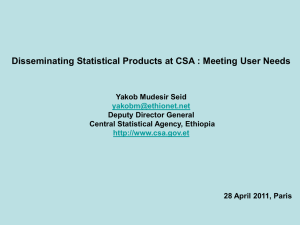what is the role of regional organizations?
advertisement
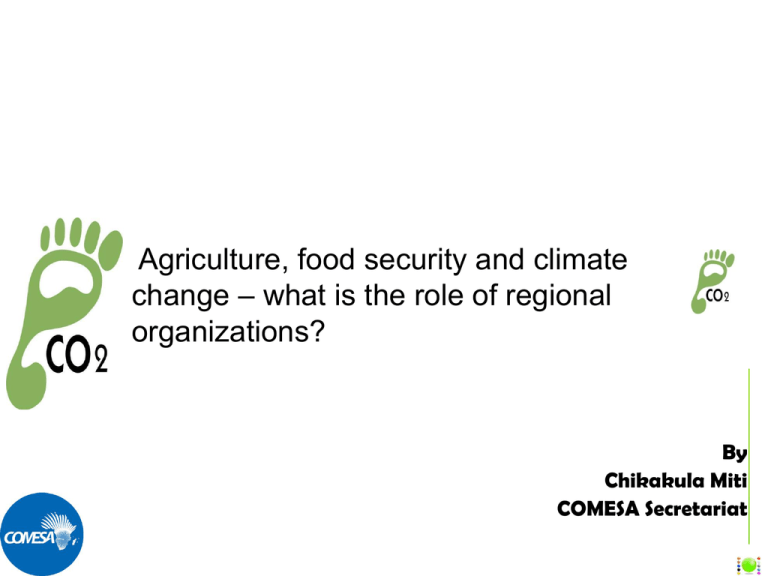
Agriculture, food security and climate change – what is the role of regional organizations? By Chikakula Miti COMESA Secretariat Introduction – Attainment of Food security is still a challenge e.g according to fews net DRC with 6.4 million persons needing food in 2013/2014, Sudan (3.3), Ethiopia (2.7) and Zimbabwe (2.2). Zambia and Swaziland have figures well below a million. – CC magnifies, intensifies and speeds up already serious threats to ecosystems and the people – Droughts and floods are becoming prevalent – Warming up of the sea - warming temperatures damage coral reefs and drive fish away from the tropics What is the role of the RECs • RECs have been created to foster economic integration • COMESA’s Vision is to “be a fully integrated, internationally competitive regional economic community with high standards of living for its entire people ready to merge into an African Economic Community”. • EAC’s vision is to be a prosperous, competitive, secure, stable and politically united East Africa. • SADC’s vision is to be a common future, a future within a regional community that will ensure economic well-being, improvement of the standards of living and quality of life, freedom, social justice, peace and security for the people of Southern Africa. • For COMESA Agric Accounts for more than 32 % of GDP), 80 % of labour force, provide 50% of raw material for domestic industry 3 Climate Proofing of the NAIP/CAADP • To date 16 out of 19 COMESA countries are actively engaged in CAADP. • Fourteen (14) of these member states have signed their National CAADP Compacts, highlighting key priority areas for investment. CAADP defines agriculture as: forestry , fisheries, livestock and crop. • We have made progress in Climate proofing of in Lesotho, Swaziland, Lesotho, Zimbabwe, Zambia, Malawi and Kenya - FAO/TCI 4 Climate Proofing of the NAIP cont’ • We have made progress in Climate proofing of in Lesotho, Swaziland, Lesotho, Zimbabwe, Zambia, Malawi and Kenya - FAO/TCI – screening of the CAADP Investment - An initial scoping phase to review CAADP investment plans to identify programmes adaptation and mitigation benefits; and – an in-depth analysis phase, including estimation of adaptation and mitigation potentials and identification of possible eligibility criteria for climate-smart programmes 5 • Platforms for supporting CA/CSA Upscaling Supporting the Conservation Agriculture Regional Working Group ( CARWG) – 15 countries • Established in September 2014 - Eastern Africa Working Group on CSA with main focus on CA • COMESA, EAC, organised the CSA meeting - agreed to move the agenda forward • Supporting detailed CA census in the southern Africa region – Tools have been developed 6 Supporting 14 countries on CATSF 7 Supporting In country study tours / demonstrations . 8 CSA Practical interventions Supporting CA/CSA up scaling in Uganda , Lesotho, Zimbabwe, Swaziland, Seychelles , Zambia, and Madagascar, Supporting the use of ICT in CSA in Uganda and Zambia CSA Practical interventions Extension workers trained to be CA practiciing farmers in Uganda and Zimbabwe. Lead farmer models . The Extension officer should be a lead farmer CSA Practical interventions Piloting of CA has been the main focus Organised some study tours for policy makers and farmers Provide some green house technologies CSA ICT Innovation Piloting of SMS platforms in Uganda and Zambia THANK YOU climatechange@comesa.int www.comesa.int 13 13

